|
|
|
Sort Order |
|
|
|
Items / Page
|
|
|
|
|
|
|
| Srl | Item |
| 1 |
ID:
173831
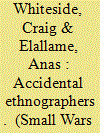

|
|
|
|
|
| Summary/Abstract |
The disillusionment with U.S.-led counter insurgent efforts to gain a deeper understanding of social dynamics in countries with extensive tribal structures has led to a rejection of programs aimed to improve cultural competency. The Islamic State movement does not share this perception, and its strategists blamed its early failures during the U.S. occupation on a flawed understanding of tribal dynamics. This paper traces the political, ideological, and structural changes the leaders of the Islamic State movement made to adapt its approach toward the Sunni tribes of Iraq and later Syria, in order to develop a deeper base of popular support for its caliphate project. The group’s study of the tribes was done by a new tribal engagement office that put into motion an ethnographic study of tribal networks in key areas. There is evidence that the inspiration for this change came from its opponents. The Islamic State movement used these new insights to win a greater level of influence in rural areas, which in turn influenced its success in 2014. This research supports the idea that insurgency and counterinsurgency success often depend on which side is best at the incorporation of cultural and societal knowledge into policy and strategy.
|
|
|
|
|
|
|
|
|
|
|
|
|
|
|
|
| 2 |
ID:
173837
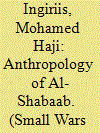

|
|
|
|
|
| Summary/Abstract |
Harakaat Al-Shabaab Al-Mujaahiduun (henceforth Al-Shabaab) is an active insurgent group in southern Somalia battling against the foreign forces and foreign-backed Somali forces. Despite recruiting both in Somalia and in the diaspora, this insurgency movement continues to increasingly recruit more local Somali youth than diaspora Somalis or non-Somalis. This article suggests that Al-Shabaab solicits support from diverse youth who – due to a confluence of factors – join the insurgency movement in various ways. The article reveals how the movement’s methods are flexible insofar as it skilfully recruits both powerful clans and marginalised clans. This pattern tests the limits of the Somali federal government in Mogadishu who have yet to develop innovative approaches to challenge and contain Al-Shabaab. The government failure not only allows Al-Shabaab to successfully carry out its operations but also to sustain itself in the midst of local communities. Through interviews with former Al-Shabaab youth, the article explores youth recruiting efforts and finds that the militant movement pursues various sophisticated means to lure numerous youth into its ranks.
|
|
|
|
|
|
|
|
|
|
|
|
|
|
|
|
| 3 |
ID:
173835
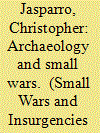

|
|
|
|
|
| Summary/Abstract |
The protection, destruction, utilization and manipulation of cultural property and material heritage, especially archaeological sites and artifacts, by state and non-state actors has become commonplace in contemporary small wars and hybrid conflicts. The U.S. and its western allies have taken a limited and largely legalistic and limited approach to this development in contemporary warfare to the advantage of adversaries who have made control of the past a key part of their strategies and operations. This paper traces the role of cultural heritage in small warfare from ancient times through its contemporary re-emergence and what the implications are for future small wars.
|
|
|
|
|
|
|
|
|
|
|
|
|
|
|
|
| 4 |
ID:
173832
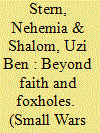

|
|
|
|
|
| Summary/Abstract |
This paper explores the vernacular roles that religious practices and experiences play within contemporary combat units of the Israel Defense Forces (IDF). We argue for an anthropological perspective that highlights the modes through which rituals serve efficacious – as opposed to semiotic – ends. In this way, we seek to push back against what we term the ‘faith in a foxhole’ paradigm, where religion is primarily seen as a meaning-making system whose nearly sole function is to aid soldiers in coping with the chaos and uncertainty of combat. We demonstrate how amidst the low-level and long-term style of contemporary asymmetrical warfare, ritual practices can often function less as the matrix for broader meaning making systems but are rather mobilized in ways that are meant to support certain practical and pragmatic goals. The article concludes that while scholars have mostly focused attention on the institutional forces and political consequences of ‘religionization’ within Israeli society, they have missed the many vernacular ways in which Israelis mobilize and instrumentalize their use of ritual and religious practices in both military and civilian contexts.
|
|
|
|
|
|
|
|
|
|
|
|
|
|
|
|
| 5 |
ID:
173833
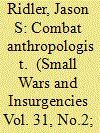

|
|
|
|
|
| Summary/Abstract |
Charles T. R. Bohannan was an instrumental figure in US successes in counter-insurgency in the immediate post-war era. These successes were not just vested in his wartime combat experience, but his pre-war training in archeology and anthropology. Brilliant, tough, and eccentric, Bohannan parlayed his extensive work with foreign and distant cultures into a view of guerrilla warfare that bolstered US successes in the Philippines and Vietnam, alongside his more celebrated boss Edward Lansdale. Here, we see how Bohannan’s view of war, culture, and statehood were impacted by a career among Native Americans, ancient peoples, and challenging orthodoxy at every turn.
|
|
|
|
|
|
|
|
|
|
|
|
|
|
|
|
| 6 |
ID:
173830
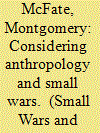

|
|
|
|
|
| Summary/Abstract |
Almost every war since the origins of the discipline at the beginning of the 19th century has involved anthropology and anthropologists. In some cases, anthropologists participated directly as uniformed combatants. Following the philosopher George Lucas, one might call this ‘anthropology for the military,’ having the purpose of directly providing expert knowledge with the goal of improving operations and strategy. In some cases this scholarship is undertaken, anthropologists have also studied State militaries, which following George Lucas might be considered ‘anthropology of the military.’ Sometimes this scholarship is undertaken with the objective of providing the military with information about its own internal systems and processes in order to improve its performance. At other times, the objective is to study the military as a human group to identify and describe its culture and social processes. Both ‘anthropology for the military’ and ‘anthropology of the military’ tend to have a practical, applied aspect, whether the goal is improving military effectiveness or influencing national security policy. On the other hand, anthropology as a discipline has also had a long history of studying warfare itself, known as ‘the anthropology of war.’ The papers in this special edition fall into these myriad categories of military anthropology.
|
|
|
|
|
|
|
|
|
|
|
|
|
|
|
|
| 7 |
ID:
173839
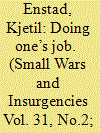

|
|
|
|
|
| Summary/Abstract |
This article investigates how political ambitions are translated into military practice in the small Norwegian contribution to the International Coalition against ISIL in Iraq from 2017 to 2019. The most important Norwegian political aims do not correspond clearly to a military objective, and thus military practice must take on a symbolic function. Understanding the processes of translation that this requires and the social complexity of operating with such aims with partners and Coalition forces is not straight-forward. The analysis of my interviews with commanders and seconds-in-command concludes by suggesting that such missions may require small-state militaries like the Norwegian to reconceive what constitutes core military practices, and that practice theory or the wider disciplines of sociology and anthropology may inform such a reconception.
|
|
|
|
|
|
|
|
|
|
|
|
|
|
|
|
| 8 |
ID:
173834


|
|
|
|
|
| Summary/Abstract |
This paper examines Frances Fitzgerald’s Fire in the Lake in the context of wider ethnological research in Vietnam stretching back to the Francophone era of Paul Mus in the 1930s and 1940s. It argues that Fitzgerald’s heavily criticised book was important for raising uncomfortable issues of political legitimacy in the US military involvement in Vietnam as well as feeding into wider debates on social revolution in Vietnam and Indochina more generally. The paper concludes by arguing that Fire in the Lake has helped shift the focus in the study of Vietnam from a western-oriented, orientalist focus on American military and political mistakes towards an emphasis on the Vietnamese rebuilding of a postcolonial society anchored in Confucian precepts and values.
|
|
|
|
|
|
|
|
|
|
|
|
|
|
|
|
| 9 |
ID:
173838
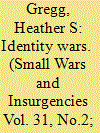

|
|
|
|
|
| Summary/Abstract |
Collective identity building is a critical component of most insurgent movements, including constructing a compelling cause with which individuals can identify and a sense of purpose and camaraderie. Counterinsurgencies, by contrast, devote surprisingly little attention to creating identities that compete with insurgents. Instead, they tend to focus on providing goods and services to vulnerable populations with the assumption that emotional resources, such as a sense of identity and purpose, are not necessary. This article draws from theoretical work on identity building to outline how collective identities are constructed, what they include, and how they shape human behavior. It then considers the U.S. led operations in Iraq from 2003–2011, and compares these efforts to the emergence of Sunni Islamist insurgencies in Iraq to investigate how insurgents used identity building, but counterinsurgents did not. It then applies this theoretical literature to construct a program for how counterinsurgents could include identity construction as part of its strategy to undermine insurgent movements.
|
|
|
|
|
|
|
|
|
|
|
|
|
|
|
|
| 10 |
ID:
173836
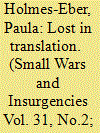

|
|
|
|
|
| Summary/Abstract |
Drawing upon ethnographic data gathered over a six year period, this paper illustrates how the contrasting worldviews of US Marines and anthropologists frequently led to misunderstandings, frustrations, and garbled interpretations as the two struggled to work together to help resolve conflicts in Iraq and Afghanistan. I examine three key military domains where cultural experts and Marines attempted to work together to understand the cultural factors at play in both Iraq and Afghanistan: first as interpreters or experts in pre-deployment language and culture training programs; secondly in theater on the Human Terrain Teams; and third as cultural SMEs (experts) in military planning rooms. As the case studies and interviews illustrate, while both sides thought they were working together to understand the foreign cultures where they were operating, the real cross-cultural misunderstanding was ironically between the cultural experts and Marines.
|
|
|
|
|
|
|
|
|
|
|
|
|
|
|
|
| 11 |
ID:
173840
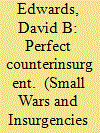

|
|
|
|
|
| Summary/Abstract |
In 2009, Major Jim Gant published a treatise online entitled One Tribe at a Time, outlining a strategy for victory in Afghanistan based on the still untested counterinsurgency doctrine developed by General David Petraeus. Gant was given the opportunity to put theory to the test by returning to the village of Mangwal in eastern Kunar Province. Evaluation of Gant’s mission has been overshadowed by the scandal that led to his resignation from the US Special Forces. This essay provides a re-examination of Gant’s time in Mangwal based on interviews with residents of Mangwal and an appraisal of the lessons that can be learned from Gant’s attempt to put counterinsurgency principles into practice.
|
|
|
|
|
|
|
|
|
|
|
|
|
|
|
|
|
|
|
|
|